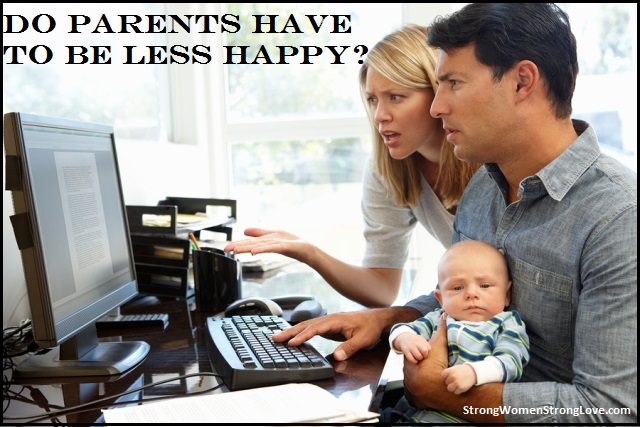by Strong Women Strong Love | Aug 16, 2016 | Parenthood, Persistent Pressures |

You may have read articles before stating that parents are not as happy as people who don’t have children. Of course, that’s not everyone’s experience with parenthood. But it’s a finding that we tend to explain away with conventional wisdom like “Well, having kids is hard. That’s just what parenting is.”
But that not may be the case.
First, the bad news. According to the latest research on the topic, the happiness gap between parents and nonparents is larger in the U.S. than it is in other developed countries. But here’s the new wrinkle on this topic: Researchers say that it’s possible to close the happiness gap through new policies on work leave and childcare.
It’s rare that social scientists can explain a phenomenon so completely, the lead researcher, Jennifer Glass, PhD of The University of Texas, said in an article for Quartz. But in countries with most family-friendly policies, parents were just as happy as nonparents.
So what does this mean for us parents here in the U.S.?
First, consider something that Glass says about U.S. parents in the Quartz article:
They often find parenting fulfilling, and wouldn’t have it any other way. But their stress levels tend to be high, which can overshadow any happiness to be gained from shepherding another human being through life.
Parenting in our culture is stressful. You aren’t doing something “wrong” if you are having a hard time meeting the demands of parenthood! Because stress comes with the territory of parenting, try these strategies:
- Get support. Be proactive in seeking out support, both emotional and practical. In other words, you need both friends you can confide in about the challenges of parenting and friends who can take your kids to soccer when you can’t.
- Strengthen your marriage. Also, look for ways you can continue to nurture your marriage so that you and your husband can support each other. You need a strong connection with your spouse to weather the stresses of parenting.
- Ask for help. Much of the work of parenting, such as managing the logistics of your kids’ lives, still falls disproportionately on women. If there’s an imbalance of parenting duties in your relationship, ask your husband directly to take on more responsibilities. It’s better to ask for help than to simmer with resentment!
- Advocate. Finally, you can advocate at your company and beyond for policy changes that help parents. Glass’ study found that paid sick and vacation leave were especially powerful ways to increase happiness.
by Strong Women Strong Love | May 14, 2013 | In the News, Parenthood, Passionate Partnership, Persistent Pressures |
According to research, the biggest drop in marital satisfaction occurs after the birth of the first child. Anyone who has cared for a newborn understands the all-consuming nature of caring for a very young baby. The challenge for couples is to integrate a little one into their lives, while retaining a sense of themselves as a couple.
Although it is certainly nice to be able to go out on a formal date, carving out the time to do so can be unrealistic for many new parents who may also be very nervous about leaving their newborn. Maintaining a connection with your spouse can be less complicated and less time-intensive than you may realize. Try these simple strategies for staying close:
1. Get physical. Eye contact, smiles, warm embraces, holding hands, sitting close to one another, or giving a quick neck massage are easy ways to maintain a physical connection without it taking much time. Resuming your sexual relationship is also important whenever you are both ready.
2. Express words of appreciation and support. Words are tremendously powerful in fostering connection. If you were a new parent, how do you imagine you would respond to your spouse saying the following things to you?
“I’m so glad to see you.”
“Thanks so much for letting me get a little sleep. I really appreciate it.”
“This is hard work, but I’m so lucky you are in here with me.”
“I miss you.”
“You are amazing with the baby.”
Kind words do not take much time to utter, but can have long-lasting positive effects on the bond with your spouse.
3. Establish yourselves as a team. Parenting is much easier when you are truly working together. Much too often, what actually happens is that Mom becomes the parent, while Dad moves into the position of being her helper. Even our language reflects this arrangement: “Is your husband helping you with the baby?” The first few weeks of parenthood are a vital time to negotiate your partnership as parents. It is important you support one another as you both muddle through the challenges of caring for a new baby. Don’t be too quick to swoop in and take the baby if Dad is struggling. If you are breastfeeding, consider pumping occasionally so Dad can bond with the baby and you can get a little rest.
If you are able to move toward one another and work your way through the challenges you face after a baby enters your lives, your relationship will definitely emerge strengthened.


